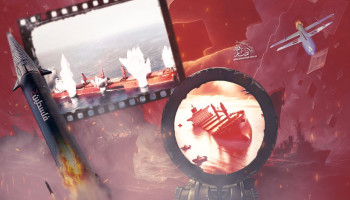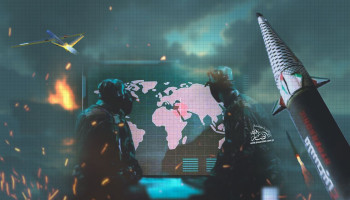Published: Muharram 15, 1447 AH
Yemeni operations have returned to the Red Sea with renewed momentum after months of relative calm. However, this return is markedly different from previous rounds. The strategy for inflicting damage on ships has shifted from partial to complete sinking—a message that all collaborators with the Israeli enemy are expected to take seriously.
The Yemeni decision, declared months ago, prohibits the passage of any ship—regardless of nationality—through the Red Sea and Bab al-Mandab Strait if its destination is an Israeli port, specifically the port of Umm ar-Rashrash (known by the enemy as "Eilat") located in southern occupied Palestine.
On March 7, the leader, Sayyid Abdul Malik Badruddin al-Houthi—may Allah protect him—delivered an exceptional speech regarding developments in the Gaza Strip. He issued a four-day ultimatum to the Israeli enemy to allow humanitarian aid into Gaza, warning that failure to comply would lead to the resumption of Yemeni military operations in the Red Sea. Since that day, no ship has dared to cross the Red Sea toward Umm ar-Rashrash, despite ongoing U.S. aggression against Yemen and efforts to rescue the temporary Israeli entity and break the siege imposed on it in the Red Sea.
Despite the aggressive U.S. military campaign against Yemen, Washington ultimately opted to withdraw and concede defeat. It was forced to sign an agreement with Sanaa to cease attacks on Yemen in exchange for a halt to targeting American vessels in the Red Sea. Importantly, the agreement bore no mention of the Israeli entity, a move many observers interpreted as the first time the U.S. had abandoned its Israeli protégé in its modern history.
This week has seen significant developments as some companies tied to the Israeli entity attempted to cross the Red Sea toward the port of Umm ar-Rashrash. This blatant defiance of the Yemeni ban is difficult to understand—what purpose or logic lies behind such a gamble? All companies are well aware that Yemen does not issue idle threats. When Yemen speaks, it acts. Still, some attempts were made to "test the waters" and evaluate Yemen's position, particularly after the cessation of the U.S.-Israeli aggression against the Islamic Republic of Iran. Some tried to promote the claim that Yemen is merely a proxy of Iran. These ship-sinking operations have now shattered such propaganda.
The sinking of two ships in the Red Sea is a pivotal development that will shake the Zionist entity and its American and Western backers. Netanyahu is expected to exploit these events to pressure the U.S. and the West to protect Red Sea navigation from what he calls "the Houthis," attempting to justify further military action against Yemen. However, this scenario has proven futile. Yemeni military capabilities are rising, and American and Western aircraft carriers, destroyers, and warships have failed to achieve any naval victory over Yemen—proving that Yemen is the undisputed master of the Red Sea.
The full sinking of the "Magic Seas" vessel, with footage broadcast with audio and video, and the targeting and documentation of the "ETERNITY C" vessel, deliver multiple powerful messages:
To the Zionist entity: No attempt to lift the naval blockade on your Red Sea ports will succeed. The only solution is to halt the aggression and lift the siege on Gaza.
To companies and ships dealing with the enemy: Do not take risks or gamble. The Yemenis do not joke. Any attempts at deception or evasion will be met with further disciplinary actions. Companies must comply with the Yemeni decision.
To global arrogant powers: Yemen is steadfast in its decision to besiege the enemy entity. It fears no naval power in the world and is prepared for any scenario. If America and the West attempt again to use military force to break the blockade on the Zionist entity, the scenes of complete ship sinkings will not stop at commercial vessels—but will extend to warships, destroyers, and even aircraft carriers.
What is happening in Yemen cannot be separated from the broader battlefields, particularly developments in Gaza, which is going through the most significant phase in its history. The American-Israeli aggression has no intention of seeking peace or ending the war or blockade. Instead, they are escalating their genocidal campaign, offering Palestinians the choice between destruction or displacement. They believe that the defeat of Hamas and resistance factions is imminent, and that military victory and the occupation of Gaza are within reach.
But Israel’s ambitions go beyond destroying Gaza. Its true aim is to ignite the entire region and eliminate all resistance movements. Hezbollah in Lebanon faces an existential threat. Yemen is targeted with plots and conspiracies to isolate it and prevent it from supporting Gaza. Fires are being stoked to eventually reach the Islamic Republic of Iran, while the criminal Netanyahu seeks nothing less than the destruction of Iran’s missile arsenal and nuclear program.
We are thus facing enemies who accept no compromises, nor the existence of nations or movements that reject their dominance. They seek a region fully submissive to them—like the Gulf rulers, Syria’s Golan collaborators, and Egypt’s Sisi—allowing them to loot resources and violate sovereignty amid deafening silence from both the people and their rulers. This, however, is something Yemen and the free people of the region will never accept.







